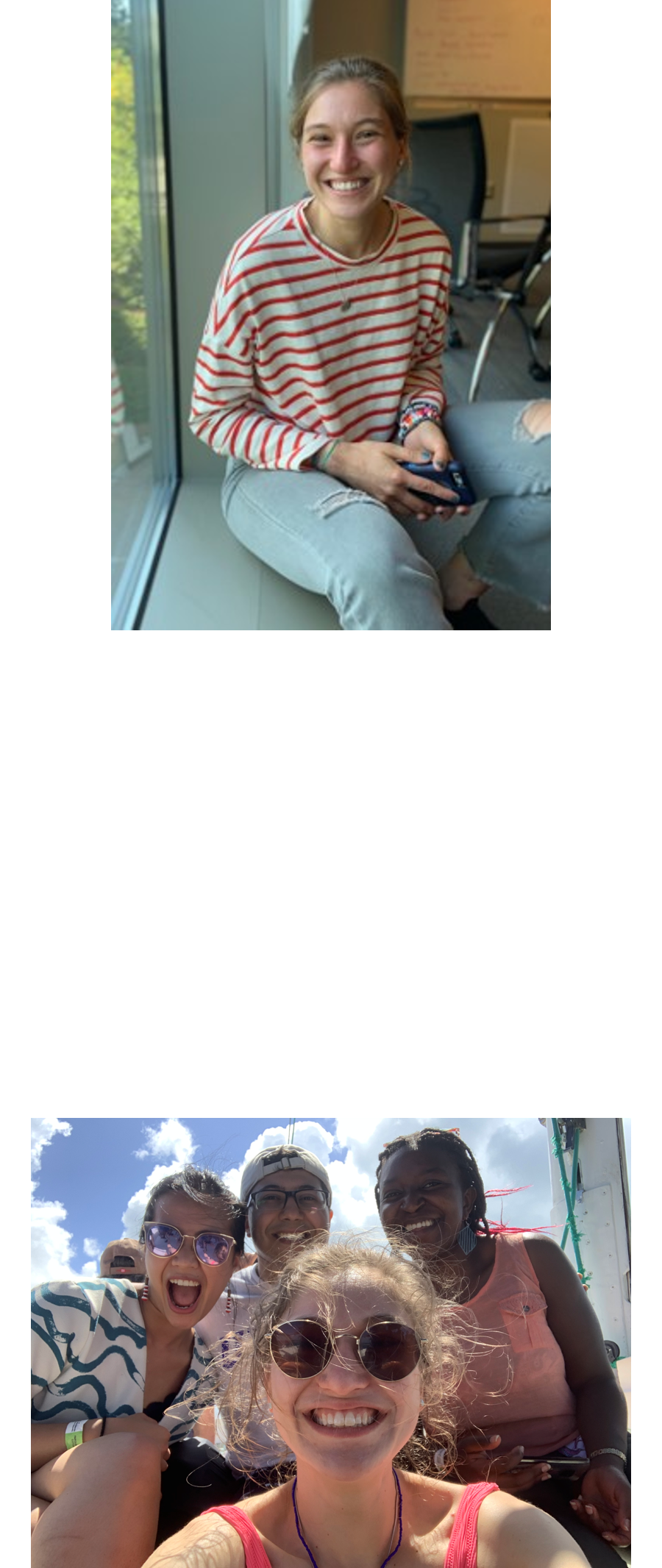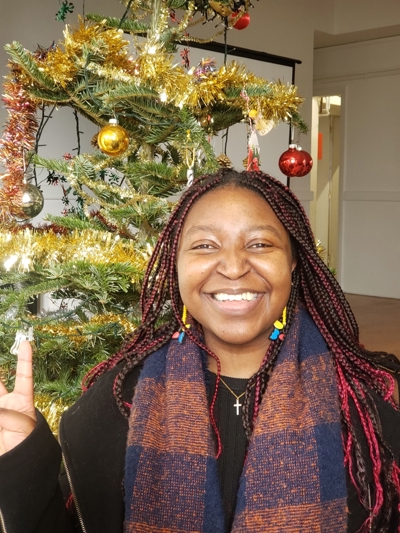A Day in the Life
Are you curious about what a typical day is like for an MD/PhD student? Check out the schedules of current students across different stages of training in our program!
Pre-clinical Student (MS1, MS2)
 |
Jillian Belgrad's Day 9:00am: I attend lectures until 2:15pm. We are currently in the Head and Neck Unit of Development, Structure and Function (DSF), the anatomy course of first year. The course starts and ends with a Rose Ceremony for the donors, allowing students to share their appreciation for this special learning opportunity. Every year, students also organize a Memorial Service for the donors’ families. 2:30pm: In the afternoon, I learn to perform a physical exam of the neurologic system with my anatomy groups from our Learning Communities mentor. The content of this course is structured to parallel each DSF unit to integrate medical knowledge with clinical skills. 5:00pm: I work out at the gym at the Albert Sherman Fitness Center. The Albert Sherman Fitness Center is a 24/7 gym and is free for members of the UMass Chan community. They also offer a variety of group classes every day, ranging from yoga to high intensity interval training. 8:00pm: After a long day on campus, I like to wind down by watching the Bachelor at a friend’s house. 10:00pm: Before going to bed, I like to review what I have learned for the day and study a bit for upcoming exams! Students can take advantage of services offered by the Center for Academic Achievement; they work with students one-on-one to find strategies that meet their personal educational goals, as well as providing tutoring. |
Clinical Rotations Pre-Thesis Lab Transition
 |
Gabby Kastrunes' Day5:15 a.m.: I wake up, make coffee, eat a quick breakfast, and get myself ready for the day. 5:45 a.m.: I walk to University Campus, where I'll be completing my pediatrics inpatient rotation. It's a 10-minute walk from my house. 6:00 a.m.: The night team completes sign out, reporting overnight events, new admits, and any pertinent information to the day team. 7:00 a.m.: I pre-round on my patients and prepare my oral presentations. 8:00 a.m.: I go to morning report, where I listen to a presentation about an interesting clinical case by a pediatrics resident. 9:00 a.m.: My team begins rounding on our patients. I get to present my patients, including their history, physical exam findings, labs, and my proposed treatment plan to the attending, residents, and another medical student. We confirm our plan and then I get to report it to my patients and their families. The attending, residents, and medical students provide feedback to help me improve my skills. There are a lot of opportunities to learn about the pathophysiology of different diseases, generating differential diagnoses, and treatment guidelines. 1:00 p.m.: Rounds are finished. I grab lunch, send consult notes to other teams, and write progress notes for my patients. Over the course of the rotation, the residents give me the opportunity to take on more patients and more responsibilities for their care. 6:00 p.m.: I sign my note over to my resident and I walk home from the hospital. 6:30 p.m.: I water the plants in the garden. My roommates and I live in a house near campus. 6:45 p.m.: I meet up with a friend to go for a run at a local park! 8:00 p.m.: I eat dinner, a meal that my friends and I made on Sunday during our weekly meal-prep. Clinical rotations can be busy, but my friends and I do our best to spend time together often. 8:30 p.m.: I finish up my night by doing UWorld questions to prepare for my shelf exam later this month. 10:00 p.m.: I get ready for bed. I try to prioritize sleep, especially when I'm on a clinical rotation. |
Graduate Student (Biomedical Research)
|
|
Madi Marasco's Day5:30 a.m.: I start my day early because I like to get a lot of personal stuff done before going to lab. I spend this time drinking coffee, eating some carbs before I exercise (usually two waffles), and giving my dog lots of belly rubs. I also sometimes use the early morning to read papers or work on presentations because I focus well when my house is quiet in the morning. 6:30 a.m.: Run! Rain, wind, snow, or shine you will find me running in the morning. I used to do early morning CrossFit classes but switched to long-distance running in 2023. I decided to train for my first marathon during my graduate school years and found that getting my runs in before going to lab worked the best for me. I was able to train for and run the Boston Marathon in April 2025 while balancing all my lab experiments, seeing friends, and spending time with my family! It just takes some good schedule planning and a lot of discipline. 8:00 a.m.: My dog, Poppy, is a border collie and has a lot of energy that she needs to burn in the morning. I like to take her for a 45-minute walk in the woods. Being outside is also a great time for me to think about my experiments and future projects. 9:00-11:00 a.m.: A typical day for me in the lab is to spend the first hour reading papers, planning experiments, or having morning meetings. 11:00 a.m. -5:00 p.m.: I tend to eat lunch at my desk because I find that working while I eat helps me make sure I get everything done despite my busy morning schedule. After lunch I like to do my main experiments which consist of both in vitro and in vivo work. 5:00-6:30 p.m.: Several of my projects are collaborations with other groups in and outside of UMass, so I like to spend my early evenings updating my collaborators. I also find that a great way for me to wind down is to use this time to do my data analysis and figure making. 7:00 p.m.: I love catching up with family about our days while we eat dinner. We often will grill outside and talk while our dog runs around the back yard (I love to start and end my day outside). 9:00 p.m.: In order for me to marathon train while being a busy graduate student (sometimes I have a 10-mile run before I go to lab), I need to get as much sleep as possible. That means going to sleep early and waking up early! |
|
|
|
|
Melanie Barbini's Day6:30 a.m.: I like to start my day with a workout, which helps me feel energized and ready to focus in lab. 8:30 a.m.: I check on my mouse colonies and plan experiments for the week. My research uses mouse models of multiple sclerosis to understand how the immune system contributes to brain inflammation and damage. 10:00 a.m.: I perform stereotaxic injections, a type of small brain surgery in mice, to deliver AAVs (adeno-associated viruses) into the ventricles. These viruses turn off specific immune proteins, which allows me to study how they affect inflammation and myelin loss—changes also seen in patients with multiple sclerosis. 1:00 p.m.: After lunch, I process brain tissue for immunofluorescence staining so I can look at immune cells and myelin under the microscope. I also collaborate with other researchers who use advanced methods like MERFISH (a type of spatial transcriptomics) and single-cell RNA sequencing to study thousands of cells at once. 3:30 p.m.: I often join meetings or collaborative talks with other labs and departments. These are great chances to share ideas, get feedback, and connect my project to the bigger picture of MS research. 5:30 p.m.: After wrapping up in the lab, I enjoy spending time with friends—playing pickleball, going for a walk, or cooking dinner together. 7:30 p.m.: I usually finish the evening by analyzing data or working on a figure for an upcoming presentation. 10:30 p.m.: Before bed, I like to read or catch up with family and friends—it helps me recharge for another full day in the lab. During the PhD years, I’ve enjoyed diving deeply into research while staying connected to medicine. The MD/PhD program has provided a supportive community that helps us grow as both scientists and future physicians. |
Graduate Student (Clinical Research)
 |
Laël Ngangmeni's Day
Morning: |
Clinical Student (MS3, MS4)
|
|
Samantha (Sammy) Tse-Kang's Day6:00 a.m.: I start my day and prepare my daily cup of coffee. 6:30 a.m.: I walk my dog Luna around my neighborhood while listening to the Cribsider Podcast. My husband and I have lived in the same triple-decker apartment in Worcester for many years during my studies. Fun fact: Worcester is home to the highest concentration of triple-decker houses. 8:30 a.m.: I arrive at the Pediatric Genetics clinic in the Benedict building on the UMass Chan University Campus and review patient charts for the day. The first patient usually arrives around 9:00 a.m. If there is extra time, I usually perform some literature reviews on interesting patient cases. In fourth year, students have the opportunity to explore multiple electives that are of interest given the specialty they will be applying to in residency. 12:00 p.m.: After the last patient of the morning, I usually grab lunch at the hospital cafeteria (often the daily soup – beef and barley is my favorite). I complete my notes and research genetic syndromes I’m unfamiliar with. 1:00 p.m.: For the rest of the afternoon, I see additional patients in the clinic. If there is downtime, the supervising attending will usually teach about a specific subject related to genetics. 5:00 p.m.: Things are usually winding down and I finish the rest of the notes before heading home. 6:00 p.m.: I drive to Quinsigamond State Park (Lake Park) with my husband to play a few rounds of tennis. Quinsigamond Lake is an awesome park about a 5-minute drive (30-minute walk or 15-minute run) from UMass Chan. It has a football field, a track field, multiple tennis courts, and a beautiful walking path. During the summer, you’ll find many people strolling in the park and barbecuing with families and friends. 7:00 p.m.: I eat dinner (usually a mix between home cooking and takeout) and spend some quality time with my family. My husband and I will sometimes put on a reality TV show while Luna sleeps on our laps. I’ll also review topics that came up during the day to consolidate clinical knowledge. 11:00 p.m.: I spend the rest of the night winding down with some reading (usually a good fiction) prior to bed. |







